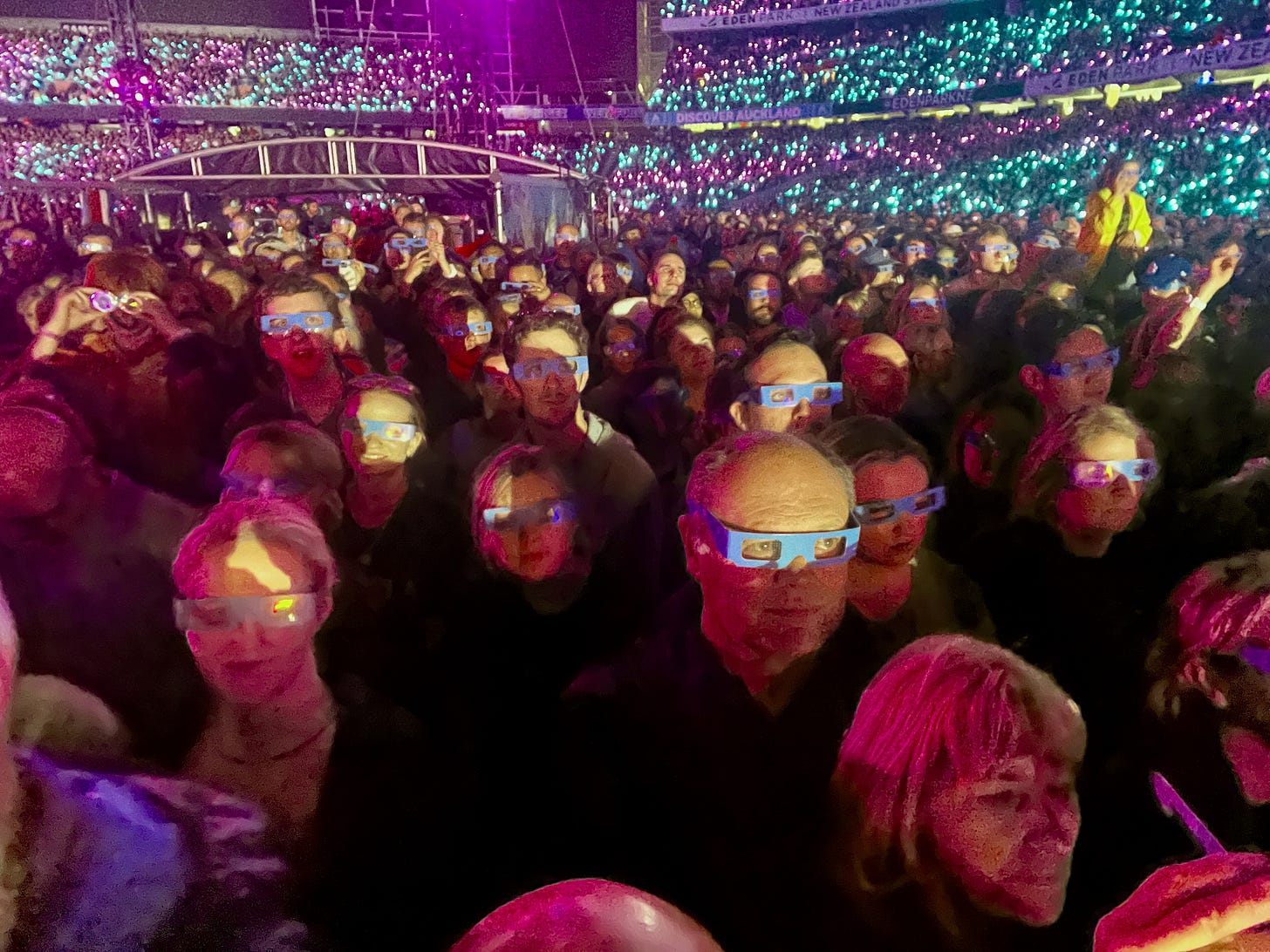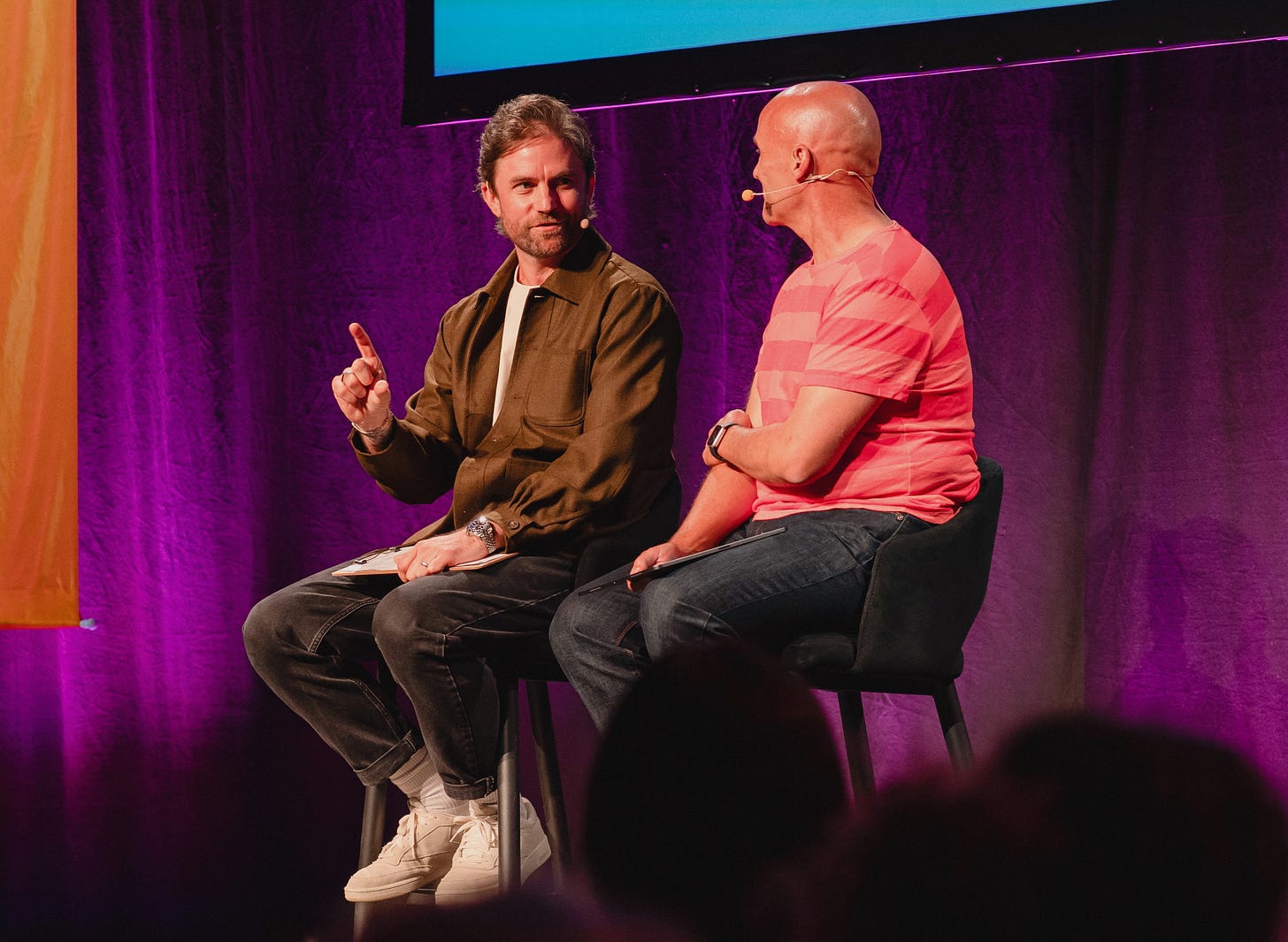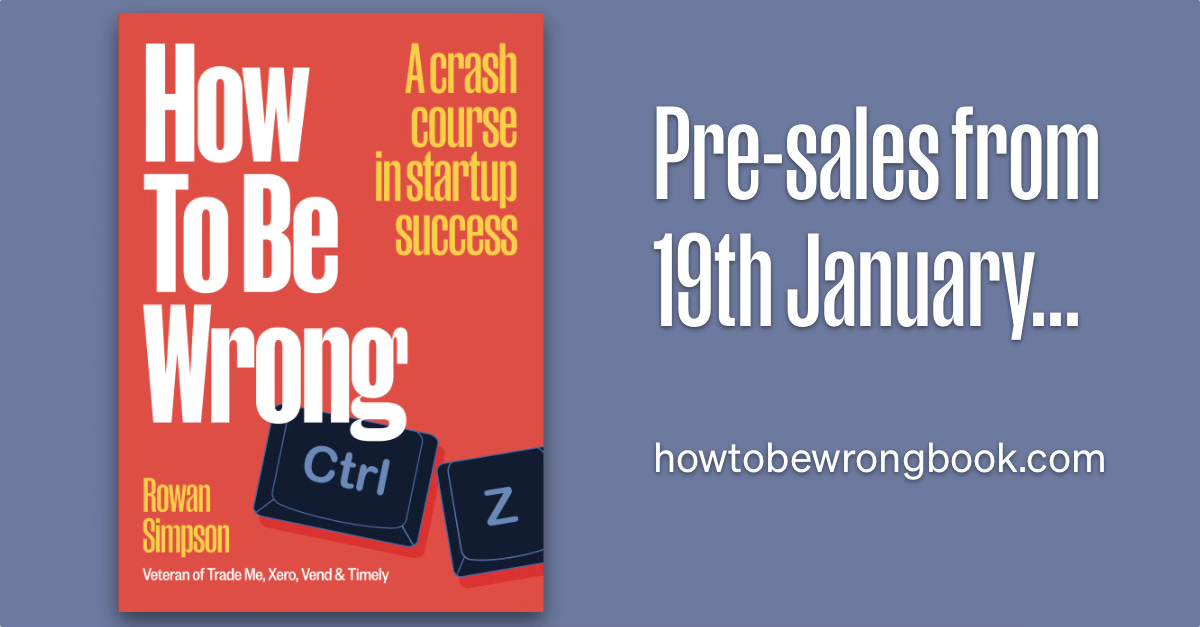A sky full of stars
Top Three Summer Series - Part 3
Welcome to the 2024/25 Top Three Summer Series. This is the second of six short posts to be published through December and January, leading up to the launch of my new book How To Be Wrong in early 2025. Enjoy!
Aim … Fire 8th December
Feedback Loops 15th December
A sky full of stars 22nd December
At the bottom of this post you’ll find a link to download the first chapter of the book. Once you've read it I'd love to hear what you think.
🥁 Just a drummer in the band
Over three nights in November nearly 150,000 people saw Coldplay perform their Music of the Spheres show at Eden Park. It was a buzz to don the moon goggles and join the over 10 million people who have made this a record breaking world tour.1
This gives me a good excuse to ask my favourite Coldplay trivia question:
Can you name the other three members of the band?
The question makes a point, but doesn’t even need to spell it out. Nearly everybody can name the lead singer and songwriter Chris Martin. During the nearly 28 year history of the band he’s never been out of the spotlight for long - even as a casual fan I know so much more about him - from his “conscious uncoupling” from ex, Gwyneth Paltrow, to his habit of kissing the ground like a pope, his 6:1 diet and his kids called Apple and Moses.
However, my real heroes are the other three. I’d be shocked if many of you even know their names. For the record they are Jonny Buckland, Guy Berryman and Will Champion - and, yes, I had to check Wikipedia to be sure. Would you recognise them if you passed them on the street? I know nothing about their relationships, what they eat for breakfast or how they spend their money - given the band famously split their royalties 25% each they all have just as much to spend as their much more famous singer. And I don’t care!
It’s a good reminder to optimise for the right things. Being the most famous probably isn’t it!
When the band members were introduced at the concert I was especially interested to hear Chris describe the drummer, Will, as the band’s “musical director”. As well as drumming Will also sings backup vocals and plays guitar and keyboards. And clearly much more than that behind the scenes too, away from the spotlight. In interviews Martin has credited Champion with “keeping the band's musical standards high” and preventing them from “releasing material that isn't up to par.” I reckon it’s much easier to do that from relative obscurity.
Every Chris needs a Will.
🎚️ Pretty good
Speaking of quiet ones, a couple of weeks ago at Sunrise in Wellington I had the rare opportunity to speak live on stage with another one of my heroes - Joel Little.
You might not immediately recognise the name, but I’m sure you know many of the famous songs he’s helped to create: for example Young Dumb and Broke by Khalid, Whatever it takes by Imagine Dragons, Me! by Taylor Swift and probably the most well-known of all Royals by Lorde.
That was recorded back in July 2012 - at his studio in Auckland - with a then-15-year-old called “Ella”. Fast forward more than a year to 12th October 2013. Ella was Lorde and Royals was #1 on the US Billboard charts. The accolades it has achieved since are almost unbelievable: #1 in US for 9 consecutive weeks, #1 in NZ for 3 weeks, #1 in the Canada, UK, Spain, Sweden, Belgium, Ireland, Israel, Italy, Venezuela, top-10 in Germany, Denmark, Finland, Hungary… 14x platinum (meaning ~22million copies sold)… in 2018 Rolling Stone Magazine ranked it #9 in the list of greatest songs of the 21st Century… and, not least, together they won “Song of the Year” at the 2014 Grammy Awards.
I loved our conversation about the role of a “producer” - which, by the way, is a label I’m definitely stealing to solve the long-standing dilemma I’ve had in describing the role I play with startups I work with. We talked about what it’s like to have that kind of global success, and the lag between doing the work and getting the recognition. In his case it was years of far-from-glamorous heads-down work after that massive hit before the next #1.
One of the things that immediately stands out about Joel when you meet him is how friendly and approachable he is. In a word, how “normal” he is. I wanted to understand how he achieved this, even while living and working in LA amongst literal rock stars and divas.
I think I found part of the answer in what I’ll describe as his kiwi-ness. I asked him if he knows right away when he hears a hit song in the studio, long before it’s actually a hit song or even completed. He described the relatively short time it took to go from a simple beat and melody and some lyrics scribbled on a page to the first recorded version of Royals. He said when he heard it he knew that it was “pretty good“.
I think expressions like this might be our secret superpower. We actually operate in a narrow range in New Zealand: something great is “pretty good”, something terrible is “pretty average”. It keeps us grounded. But we do have to be careful about this, especially when we’re working internationally. People overseas don’t always hear the same things that we think we’re saying. For example, I tell the story in the book about pitching Vend to investors in Silicon Valley. When we told one of them things were going “pretty good” it backfired - the meeting was over soon after that. We quickly learned that over there, the only acceptable responses are "amazing!" or "incredible!”
I think being understated is underrated. Pretending to be something we're not is exhausting and ultimately counterproductive. Remember that next time somebody tells you to be successful you have to fake confidence - that’s nearly always bad advice.
Joel is a perfect example - he quietly built a formidable (and very valuable) catalogue of hits, while letting the artists shine. To me that’s a different, but just as important, kind of creative genius.
Every Ella or Taylor or Khalid needs a Joel.
Thanks to my friends at Blackbird who made that conversation at Sunrise possible. If you’re interested in learning more about Joel’s answer to the awful question: “What are you doing next?” , check out Big Fan.
🦻 We can’t hear you!
This all gets to a core theme of the book - something I’ve wrestled with for a long time.
I've always been more comfortable working behind the scenes and letting results speak for themselves. But I've learned there's an important balance to strike. Sometimes being too quiet means important lessons don't get shared. Sometimes letting the loud ones dominate the narrative creates a distorted view of what it takes to be successful. That’s unhelpful to others who might want to follow in those footsteps or build on those successes.
When only a subset of startup stories get told, the myths that develop ultimately hurt us all. They encourage founders to focus on the wrong things - polishing their pitch rather than building their product, chasing headlines rather than focussing on customers, getting sucked into “startup theatre” rather than putting their heads down and doing the hard work. They create unrealistic expectations about what success looks like and how long it takes. And they probably also discourage talented people - who don't see themselves reflected in those stories - from joining these teams in the first place.
This is what I took away from watching Will perform, and the conversation with Joel: Be more you. It's not only much easier, it's actually essential if we want to create anything that lasts. As they both demonstrate, we can all achieve remarkable things while staying true to who we are.
Fame is a vanity metric.
🧚 Once upon a time…
You've probably heard the story: a lone genius has an amazing startup idea, hacks away all night at their computer powered by energy drinks, launches to instant success, and sells for squillions before retiring to sip mojitos on their private tropical island. Yeah ... that's not this book!
It’s called How To Be Wrong. So it should be no surprise I start with a behind-the-scenes look at four companies I worked on at the moments each of them nearly died.
Even if you know these companies, you might not know these stories: Trade Me in 2001, out of cash, with every investor saying no, three out of four of us leave. Xero in 2009, share price below IPO level with critics betting against us. Vend in 2015, sitting in a Berlin hotel room making painful calls about redundancies after funding fell through. Timely in 2020, watching Covid-19 erase bookings and revenue overnight as customers were forced to close their doors.
Download the first chapter now
Everybody who has registered for updates at https://howtobewrongbook.com received this link earlier this week - join them today to be the first to know when pre-sales are available.
It turns out this is complicated: Taylor Swift’s Eras tour has made more money, but Coldplay’s Music of the Spheres has sold more tickets. Or something like that? At least at last count?
See: Taylor Swift and Coldplay to Pollstars 2024 Year End Worldwide Chart





‘Startup theatre’ is an apt description